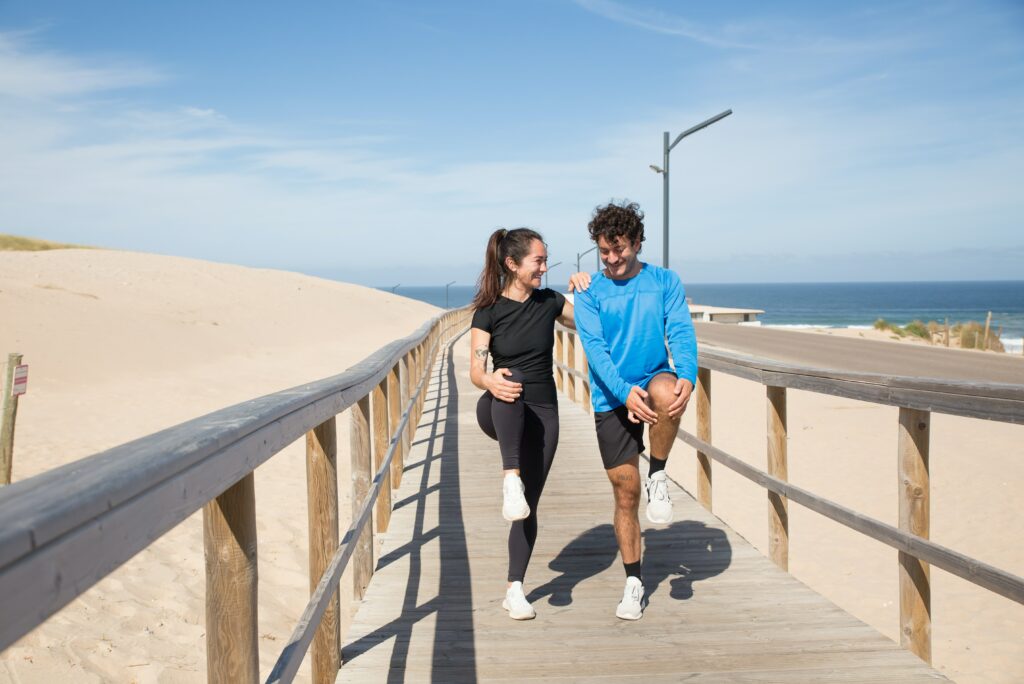By Aleksandra Vayntraub // SWNS
NEWS COPY w/ VIDEO + INFOGRAPHIC
More than seven in 10 (73%) Americans are eager to increase their physical activity to keep up with their children.
A recent study polled 2,000 U.S. adults to see how they’re staying active as our routines and lifestyles have undergone drastic change over the past two years.
Only half of respondents (51%) can touch their toes without straining. However, people are looking to change their habits, with 70% making more of an effort to move around and be physically active more now than when the pandemic started.
Whether due to working from home or lack of motivation, 42% said they struggle to stay physically active during the day.
Conducted by OnePoll on behalf of Voltaren Arthritis Pain Gel, the survey found that now more than ever, Americans are planning on making an effort to be physically active. In fact, people are renewing their commitment to an active lifestyle through activities like stretching at home (43%), at-home workouts (38%) and taking mental health walks (31%).
It’s clear that movement is a means to help people feel better about themselves and connect with those around them. Eighty one percent of the surveyed population say exercising puts them in a better mood, and 54% have made it a goal to exercise more with their family. Other motives to increase movement are to improve their physical health (67%) and mental health (51%), as well as to be a good influence on their children’s lives (42%).
However, when given a list of common hurdles, 87% of people said one or more of those prevents them from being physically active during the day, with the average person reporting getting only 3,800 steps per day of the 10,000 recommended by the International Journal of Behavioral Nutrition and Physical Activity¹. Lack of motivation (39%) and injuries (30%) are among the hurdles at the top of the list. But the biggest obstacle? Joint pain and arthritis (42%).
“Our results show that pain is the prevailing barrier that affects people who are trying to increase their movement,” said Rishi Mulgund, Brand Director, Pain Relief at GSK Consumer Healthcare. “Those with osteoarthritis (OA) have an especially challenging time, as OA negatively affects them an average of four days a week. Fifty-nine percent also said their OA makes moving and exercising more difficult.”
While those with OA may initially feel hesitant to move more, low-impact activities that are gentle on the joints can help relieve arthritis pain over time. That’s why many individuals with OA incorporate general exercise (42%) and stretching the affected area (44%) into their routine.
“Forty-four percent of those with OA said having a support system of people who understand what they’re going through has helped them manage their pain,” continued Mulgund. “Over-the-counter topical treatments can provide additional support and improve mobility.”
On a broader level, many people are also trying a number of tricks or “shortcuts” to sneak in movement throughout the day, such as walking around the house when on the phone (54%) and doing exercises such as crunches and squats while watching TV (42%).
Actively engaging in movement and activities that bring joy, such as gardening, swimming, dancing, talking walks, bike riding, or doing yoga, Pilates or Tai Chi are on the rise. But these aren’t the only ways people are moving. In fact, many are thinking outside of the box to get in more steps and incorporate physical movement into their daily routines.
“There are tons of ways you can get creative to get up and move,” said Mulgund. “Movement is more than just a way to get physical activity in — it’s time spent with family.”
MOST UNIQUE WAYS PEOPLE HAVE INCREASED THEIR PHYSICAL ACTIVITY
- “Bowl, bowl several times a week.”
- “Carry my grandkids on my back.”
- “Ride my bicycle to work about once a week instead of driving. About 2 miles each way.”
- “Do squats while on the phone.”
- “I dancercise.”
- “When I’m doing housework I try to do as much as physically possible!”
- “Use a trampoline.”
- “Use a hula hoop.”
- “Snorkeling.”
- “Doing exercises while watching Netflix.”
- “Doing steps using a step stool while heating drinks or other things in the microwave.”
- “Every time I eat something, I jog around my kitchen island for 5 minutes.”
- “I march while brushing my teeth.”
- “I play Wii Sports Resort.”
- “I play with five dogs daily multiple times a day then I do stair reps.”
References
- Tudor-Locke, C., et al. (2011). How many steps/day are enough? for adults.
https://ijbnpa.biomedcentral.com/articles/10.1186/1479-5868-8-79
